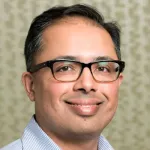
Photo by Maridav, Shutterstock.
Stanford Medicine News Center - January 17th, 2017 - by Tracie White
The Stanford University School of Medicine today announced the launch of a center to support collaborations between Stanford faculty and Silicon Valley technology companies to develop, test and implement new digital health tools.
The Center for Digital Health aims to advance the field of digital health by promoting these partnerships, performing clinical research and educating the next generation of physicians and digital health care leaders.
“Digital health is a space where Stanford should be leading the way,” said Sumbul Desai, MD, clinical associate professor of medicine and executive director of the center. “The new center will be focused on leveraging our resources and encouraging collaborations that will lead to better health care through digital technology.”
Lloyd Minor, MD, dean of the School of Medicine, said the center will further advance Stanford’s mission to improve patient care through precision health. “With our biomedical expertise and location in Silicon Valley, Stanford Medicine is uniquely positioned to be a leader in the field of digital health,” Minor said. “The new Center for Digital Health fits well within the framework of the biomedical revolution in precision health at Stanford by using the most advanced digital technologies and tools to develop care that is tailored to individual patients.”
Connecting and enabling faculty
“The goal of the center is to encourage collaborations that will help create the next generation of health care,” said Lauren Cheung, MD, MBA, clinical assistant professor of medicine and senior director of strategy and operations for the center.
The center grew out of a need to provide support and guidance to faculty who were repeatedly being contacted by both startups and established technology companies with offers to collaborate, Desai said.
“We wanted to leverage that interest and generate more opportunities for the faculty by providing the infrastructure and resources needed to encourage these relationships,” Desai said. “We can help connect interested faculty with industry, or vice versa. Say, for example, there’s a faculty member interested in pulmonary digital health research. We may know a company with the same interest. We can help connect them.”
Doing research quickly, inexpensively
“There are hundreds upon hundreds of digital health startups now, and it is very difficult for patients, doctors, hospitals, insurers, regulators and investors to know which solutions will work and which will stick,” said Mintu Turakhia, MD, assistant professor of cardiovascular medicine and senior director of research and innovation at the center. “High-quality evidence is needed to make informed decisions. We generate this evidence quickly and cheaply, targeting the real-world outcomes that matter for all of these stakeholders.”
Turakhia leads efforts to advance research in digital health at Stanford that ranges from technology assessments and implementation studies to multicenter trials. He is the principal investigator for five digital health trials. The largest of these is a 25-site, 400-patient randomized trial to test digital interventions combined with health coaches to determine whether they improve medication adherence for people with atrial fibrillation, which affects 4 million U.S. adults.
“Even after generating rigorous evidence, there can be a long, complicated path to implementation with many unanswered questions,” Turakhia said. Such questions include: What is the best way to incorporate new digital tools into the practice of health care? Will new advances actually improve patient care? Are they are worth the costs?
“Currently there is very little evidence to support how best to incorporate digital tools into practice,” Cheung said. “Stanford faculty have the expertise to help with the design and implementation of new digital health tools.”
Training and education
The center will provide training to physicians in digital health medicine at Stanford through fellowships, internship opportunities, conferences and traditional classroom material, Desai said. In addition, the center will offer educational programs to industry members.
The center is also accepting proposals for health care research projects focused on innovative uses for Apple Watches. In addition to providing up to 1,000 of the watches, the center will award $10,000 to the winning project for one year, starting in April.

